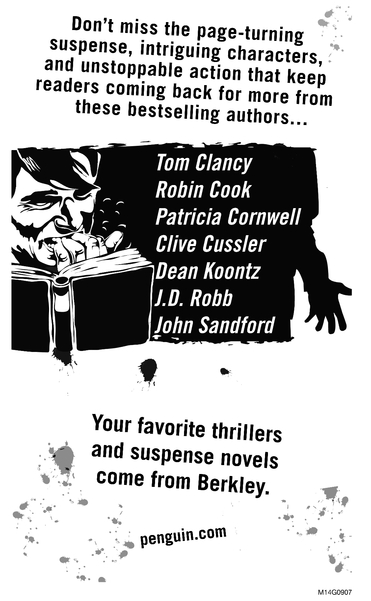Trident Force (31 page)
Authors: Michael Howe

Well, if worse came to worst, O'Brien could probably get him a job skippering one of the tourist boats that bounced up and down the Beagle Channel.
The departures were much as he'd expected. James Ives told him he was calling his lawyer the instant he got ashore. Brad, Chrissie's ex, tried to take a swing at him but stumbled and would have fallen into the boat had Dave Ellison not caught him.
And
there
was one surprise, thought Covington. I still don't really like the man, but he's done a good job. As good as any of us.
there
was one surprise, thought Covington. I still don't really like the man, but he's done a good job. As good as any of us.
The good-byes, however, were not all painful or embarrassing. Senator Bergstrom and Babs each shook his hand, smiled and left, making no more wake on their departure than they had throughout the voyage. Linda Williams was so busy talking to Rod Johnson that she hadn't even noticed Covington. Penny Evans, sad but dry-eyed, thanked him for his efforts and told him she would always admire him. That elderly woman whose name he could never seem to rememberâthe one with a husband named Fred who always smiled and never said anythingâtold him she and Fred had sailed with at least forty captains “over the past century or so” and he was the greatest of them.
And then there was Katie: “We've had a tough time, Captain Covington, but you've saved us all. Thanks.”
“I understand you three are among the few who've decided to take a few days to visit Tierra del Fuego.”
“Yes. We're all very excited. We're going to see llamas.”
“Not penguins?”
“Are there penguins here too?”
“Yes.”
“Penguins and llamas, then. Have you seen where that navy guy wrote his name on my cast?”
Covington looked and saw, “To Katie with Love, Ramon Fuentes.”
“He's a good guy, Katie.”
“Yeah, the greatest.”
Â
“These are marvelous machines your people come up with,” said Commander O'Brien as he and Mike watched three Argentine technicians struggle to get an advanced imaging deviceâsimilar to a CAT scanâdown into the now-empty number two fuel tank.
“Unfortunately, they're too damn heavy and bulky for teams like mine to tote all around the world.”
“I can understand that.”
While the two officers watched part of the Argentine explosive ordnance team rig the scanner, other members were filling the voids outside the tank with sandbags in the hope they would absorb some of the blastâjust in case things didn't go as planned.
Two paper cups of coffee later, the device was rigged and in operation. The display was spectacular. Every wire, every resistor, every diode was visible. It took the two electronic technicians less than ten minutes to make their pronouncement: There were two different charges in the same device, with their detonators both wired to a very basic radio receiver powered by a small lithium battery. No evidence of a booby trap. In sum, an only slightly complex, magnetically attached limpet mineâalthough one of no recognizable origin.
“A piece of cake,” the young lieutenant in charge said with a grin, as he supervised the placement of a preprogrammed robot next to the device and the removal of the scanner. Half an hour later the device was being towed ashore, on its own little makeshift barge, for further study. Very careful further study by more robots.
“I'm sorry you can't stay another day or two, Captain,” said O'Brien as they climbed a ladder into the superstructure. “This is a harsh land but it has its beauties. At any rate, a helicopter will pick you up at dusk and take you to the naval air base to meet your jet. With luck, the media will know nothing until it is too late for them to try to chase you.”
“Thank you, Commander.”
“Tell me, do you think you found all the devices? It's something that has always bothered me. If you find one, how do you know there're not others?”
“I always worry about the same thing.”
“Yes? I plan to have this ordnance team spend another three or four days taking another look. A new set of eyes.”
“Let me get you the job list from that last overhaul. I still think it's the best guide we have.”
“I'm sure it will be more than just useful. Will you join me for a quick drink at the ship's bar? We'll probably have it all to ourselves.”
“Are you buying?”
“Arthur is. I'll tell him later.”
When Mike got back to his suite, he found the team all packed and ready to go, Jerry having stuffed Ray's duffel for him. Ready but also dejected.
“What's your evaluation, Boss?” asked Alex. “Did we win or lose this one?”
“It's a hard call, but I think we did win. If we'd lost, we'd damn well know it.”
He looked around the room and decided to take a note from O'Brien's book. “We've got at least an hour before the helo arrives, and none of us is going to be driving anything for the next day or two, so let's have a drink. What can I get for you, Alex? Ted? Jerry? What about Ray?”
“He's dead to the world, Captain,” said Ted. “We're going to have to carry him to the helo.”
20
South of Alexandria, Egypt
A man of many names, one of which was once Omar, sat back from the window of the all-but-abandoned five-story apartment building. His silenced sniper rifle was held in place by small sandbags on the table in front of him. The room, he speculated, had last been occupied by a woman, or a girl. What other possible explanation was there for the peeling plaster's having been painted pink?
Smiling, the man returned his attention to the recently cleared field about a quarter of a mile away. Not only had they cleared the land, but they'd already started pouring the foundations for the huge new solar panel factory that was scheduled to rise there soon. It was undoubtedly a giant step forward for the local economy. Fortunately for him, despite its obvious value, a group of local dissidents had taken offense and were protesting its construction loudly.
The man saw motion at the door to the construction office trailer and bent forward to look through the sniper scope. There, filling most of the scope's field, was Mamoud al Hussein, flanked by two engineers, stepping out of the trailer. Although al Hussein had so far escaped being firmly connected with the cruise ship attack, he still represented a threat to the man. He was the only living person who knew of the man's connection to the affair.
The man saw no reason to waitâhe squeezed off two shots, the second aimed slightly lower than the first. Al Hussein slumped backward, and the two engineers, driven by instinct, recoiled while his bodyguards crouched down and scanned the area around them. The man fired two more shots into his still-exposed target. He then stood and walked rapidly out of the room, along the hall and down the stairs to the alley behind the building. Waiting there for him was an ancient motorbike. He kick-started the engine and then sputtered almost sedately through the maze of alleys that meandered among the block of tired old buildings onto a main street, merging unnoticed with the passing mass of humanity.
His problem was solved, and the local dissidents, even though they had played absolutely no role, would garner all the credit.


Other books
Grunt by Roach, Mary
Questions of Travel by Michelle de Kretser
Ada's Rules by Alice Randall
Bliss by Shay Mitchell
Crash (Black Ice MC Novella Book 2) by Bishop, Rayna
Dark Continent: Europe's Twentieth Century by Mark Mazower
Ascension by Sophia Sharp
House of Darkness House of Light by Andrea Perron